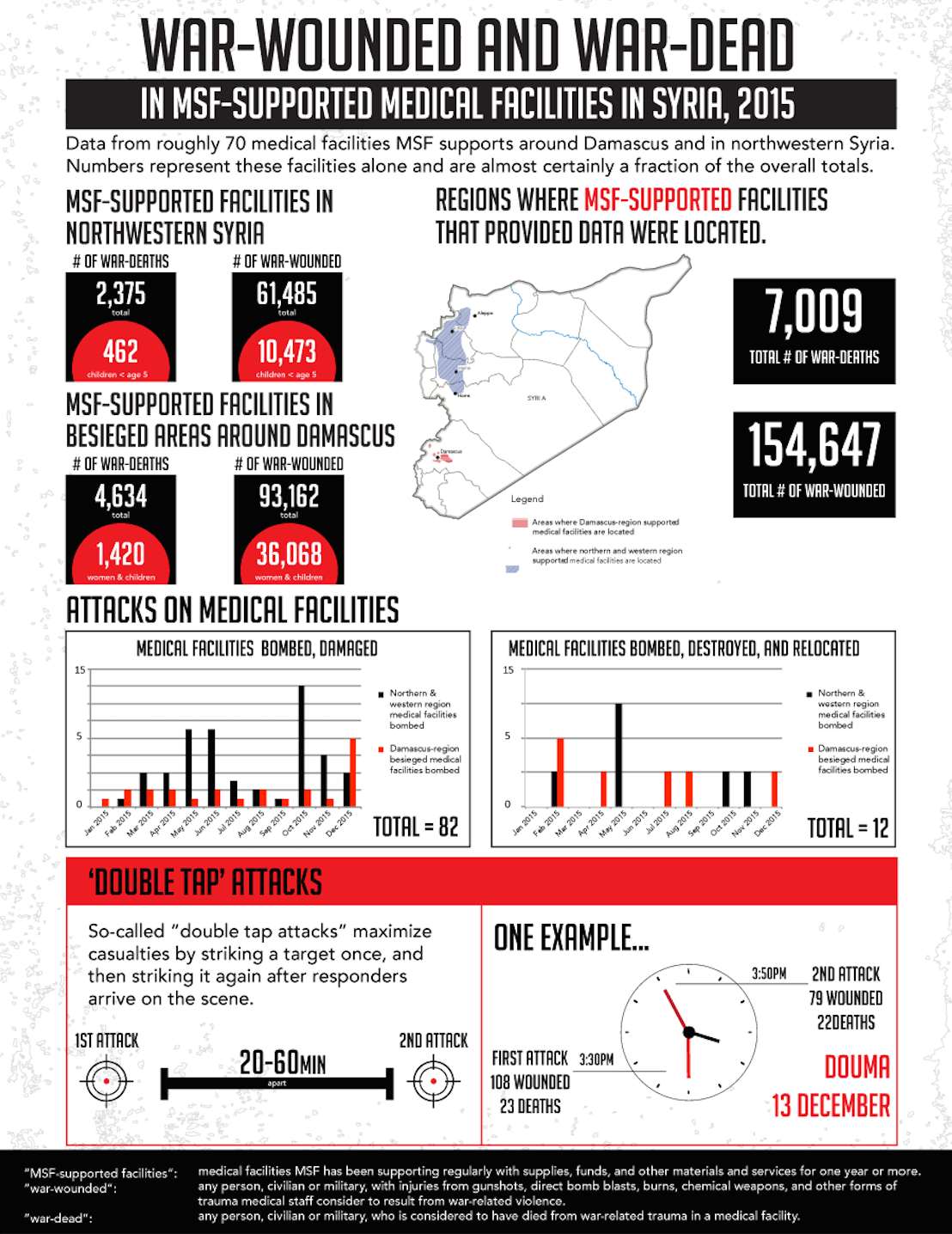[The following announcement was shared with Jadaliyya by Doctors without Borders.]
Doctors without Borders (MSF) recently held a press conference in Geneva to speak on the bombing of a hospital in Idlib earlier this week. To coincide with this, MSF is also releasing a report in regards to the war-wounded and war-dead in Syria over the course of 2015 which was compiled from 70 MSF-supported hospitals in the country, 50% of which are in besieged zones.
The report can be accessed in English here. Below is an infographic of the results of the report, which is preceded by a summary of the key findings are below:
Key Data Results:
- On war-wounded and war-dead in the Damascus region, out of 66 communities identified in the Damascus region – with a combined estimate pop of 1.45 million – and derived from 35 health facilities supported by MSF: 93,162 were treated, of whom 36,068 were women and children (child defined as under the age of 15). MSF recorded 4,634 war-dead of which 1,420 (31%) were women and children. There has been a decrease on a month by month basis due to the shift of conflict to the West and North of Syria.
- On war-wounded and war-dead in northern and western Syria, MSF regularly supports 45 medical facilities, of which an average of 34 contributed medical data (12 of which are in besieged zones). The data shows: 61,485 war-wounded treated, 10,473 (17%) were children under five.
- On mass-casualty: 74 mass casualty incidents were recorded. They account for 3,978 wounded treated, with 1,252 (31%) women and children (under 15 years); 770 dead, 228 were women and children (under 15 years). August alone, in East Ghouta, recorded 28 individual mass casualty events, which accounted for 840 wounded, 367 of which are women and children ( under 15 years) and 144 dead, 48 women and children ( under 15 years). After October, there has been an increase of mass casualty events in north and western Syria, with October marking 17 mass casualty events (575 wounded, 220 of which are women and children; 120 dead, of which 53 women and children).
- The data also shows attacks on medical facilities and deaths of medical staff: A total of 94 aerial and shelling attacks of hit MSF-supported facilities, with 12 cases leading to total destruction (first spike recorded in May and June, followed by October), as well as a total of 81 medical staff killed. To note, MSF supports only a fraction of the total medical facilities in Syria.
- Data shows that there is numerous cases of `double-tap` attacks (ie a second attack that happens between 20-60 mins after the first) – This is recorded by time in specific cases.
- In total: MSF-supported facilities alone have recorded 7,009 dead, 154,647 wounded; 30-40 % being women and children. In besieged zones in Damascus region: MSF recorded 1,400 dead and more than 36,000 wounded.
MSF`s Message:
- MSF urgently calls for all attacks on civilian targets and infrastructure to end
- MSF specifically calls for protection and respect of medical facilities, and end all attacks on them
- MSF calls for full humanitarian access to all besieged zones and unhindered movement for medical evacuations, supplies, and medical staff.
MSF specifically appeals to 4 of the UNSC permanent members to respect their own resolutions, and to pressure their allies to implement them.
